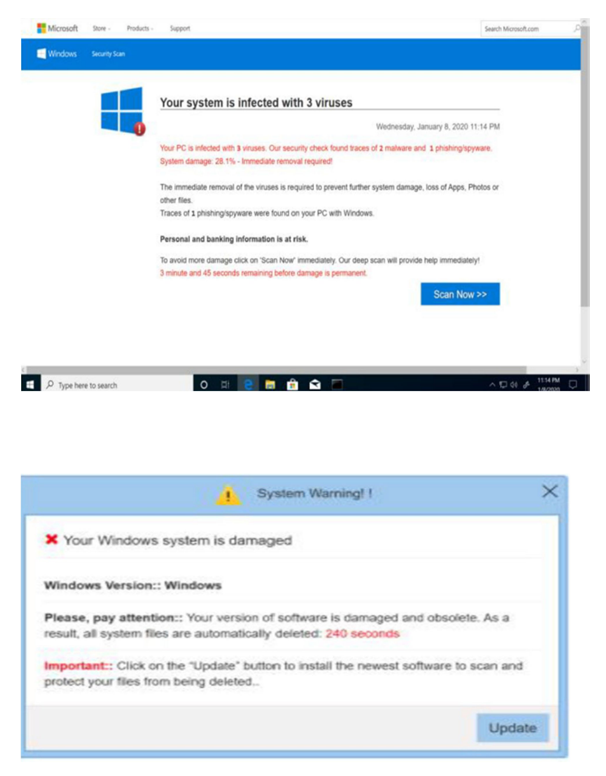Teacher
Professional
- Messages
- 2,669
- Reaction score
- 819
- Points
- 113
The FTC has revealed a scheme of antivirus companies that make money from fictitious infections.
According to a new investigation by 404 Media, the US Federal Trade Commission (FTC) has sued two Cypriot companies, accusing them of distributing malicious pop-ups that fraudulently forced users to download fake antivirus software. According to the FTC, the fraudulent scheme brought operators tens of millions of dollars.
According to court documents, the scam brought the organizers tens of millions of dollars. As part of the scheme, fraudsters also falsified the results of VirusTotal checks, passing them off as infections on victims computers. In response to the FTC's allegations, Restoro and Reimage agreed to pay $26 million in settlement fees.
According to the FTC's lawsuit, starting in January 2018, the defendants conducted a fraudulent technical support scheme, forcing consumers, especially the elderly, to spend millions of dollars on unnecessary services. The FTC requires companies to collect not only fines, but also impose a permanent ban on their activities.
The evidence presented by the FTC includes screenshots of pop-ups with fake virus messages styled like Windows system notifications and calls for urgent system scans. It was also revealed that Restoro used Google ads to attract users to its fraudulent service.

Fake Virus Notifications
During the investigation, the FTC bought the services of undercover companies, as well as made calls to Reimage support. An important point was that anti-virus protection was installed on the computer used for purchases and testing, which underlines the deceptive nature of the services offered.
Fraudulent software after installation fictitiously "detected" security problems, the solution of which was offered for an additional fee in the range from $27 to $58. Then representatives of companies offered even more expensive services, the cost of which reached hundreds of dollars. In the process of communicating with technical support, users were convinced of the need to download additional software that allows representatives to access the computer, while demonstrating fake errors in the Windows event log.
During the call, one of the representatives tried to scare the user with potential damage from Trojans and viruses, offering expensive problem correction services for $200, $300 and even $500. In addition, during the call, representatives used the VirusTotal website to create a false impression that the computer was infected, although in fact they showed the results of scanning other machines.
Reimage has already faced negative reactions to its actions, including warnings from Visa about fraudulent marketing. Neither the companies nor the FTC provided official comments on the matter.
According to a new investigation by 404 Media, the US Federal Trade Commission (FTC) has sued two Cypriot companies, accusing them of distributing malicious pop-ups that fraudulently forced users to download fake antivirus software. According to the FTC, the fraudulent scheme brought operators tens of millions of dollars.
According to court documents, the scam brought the organizers tens of millions of dollars. As part of the scheme, fraudsters also falsified the results of VirusTotal checks, passing them off as infections on victims computers. In response to the FTC's allegations, Restoro and Reimage agreed to pay $26 million in settlement fees.
According to the FTC's lawsuit, starting in January 2018, the defendants conducted a fraudulent technical support scheme, forcing consumers, especially the elderly, to spend millions of dollars on unnecessary services. The FTC requires companies to collect not only fines, but also impose a permanent ban on their activities.
The evidence presented by the FTC includes screenshots of pop-ups with fake virus messages styled like Windows system notifications and calls for urgent system scans. It was also revealed that Restoro used Google ads to attract users to its fraudulent service.

Fake Virus Notifications
During the investigation, the FTC bought the services of undercover companies, as well as made calls to Reimage support. An important point was that anti-virus protection was installed on the computer used for purchases and testing, which underlines the deceptive nature of the services offered.
Fraudulent software after installation fictitiously "detected" security problems, the solution of which was offered for an additional fee in the range from $27 to $58. Then representatives of companies offered even more expensive services, the cost of which reached hundreds of dollars. In the process of communicating with technical support, users were convinced of the need to download additional software that allows representatives to access the computer, while demonstrating fake errors in the Windows event log.
During the call, one of the representatives tried to scare the user with potential damage from Trojans and viruses, offering expensive problem correction services for $200, $300 and even $500. In addition, during the call, representatives used the VirusTotal website to create a false impression that the computer was infected, although in fact they showed the results of scanning other machines.
Reimage has already faced negative reactions to its actions, including warnings from Visa about fraudulent marketing. Neither the companies nor the FTC provided official comments on the matter.

